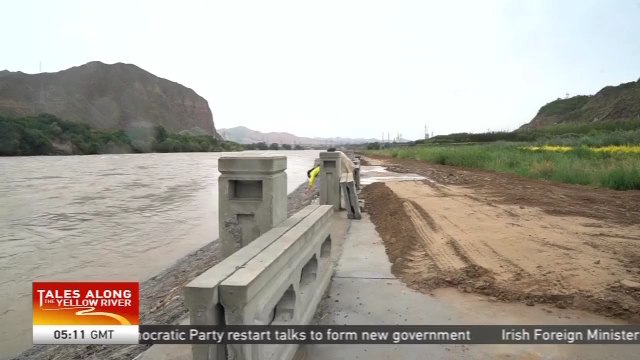
14:18, 28-Aug-2019
Protecting Mother River: Authorities, environmentalists keep eye on water pollution
Updated
14:34, 28-Aug-2019

The fast development of the Chinese city of Lanzhou has paid off in spades for the area economically. But environmentalists say there's another side to the story. Industrial pollution over the years had once tainted parts of the Yellow River. However, the efforts of authorities and some concerned locals are reversing this trend. Here's CGTN's Xu Mengqi with the report.
With two sides to every story, the mostly positive one about China's development didn't come without a cost, a cost that calls into question the environmental toll of decades of rapid urbanization and industrialization. By the time the Yellow River reaches the city of Lanzhou, it's already brown from the large amount of soil and silt it has picked up along the way. But it's also picked up something else.
XU DINGYAN ENVIRONMENTALIST, GREEN CAMEL BELL "Gansu has a lot of industries, and the factories and mines were all sources of pollution."
Since 2006, Green Camel Bell, a Lanzhou-based environmental NGO, has been reporting factories that directly dump their untreated wastewater into the yellow river and its tributaries.
The NGO says in recent years the problem has got much better.
XU MENGQI LANZHOU "A little over a decade ago, pollution of the Yellow River was still a major problem in Lanzhou and other industrial cities along the river. But over the years, as awareness of environmental protection has grown, authorities and environmentalists alike have been closely watching the water quality of China's mother river."
For local authorities, pressure to keep the water clean also comes from the central government.
This water quality monitoring station is one of many along the Yellow River that collects water samples automatically, then sends the test results directly to national authorities.
The local environmental protection agency in Lanzhou, on the other hand, focuses their work on potential pollution from individual companies.
YANG XIAOZHOU LANZHOU ENVIRONMENT SUPERVISION BUREAU "These days we require all businesses that use and discharge water to install sewage treatment facilities, and for heavily polluting factories such as those in the chemical or steel industry, it's a must for them to set up a system where we can monitor their discharges online 24 hours a day."
Since supervising factories is now largely a government task, Xu and her colleagues at Green Camel Bell have switched their focus to rural areas, where the idea of environmental protection still sounds quite novel.
XU DINGYAN ENVIRONMENTALIST, GREEN CAMEL BELL "In rural villages, pollution from pesticides, fertilizers, domestic sewage and waste is also becoming a more and more serious problem. It's going to have a larger impact too."
When asked why she's committed to being a waterkeeper of the Yellow River, Xu Dingyan says for citizens of Lanzhou, they have a special attachment to their mother river. XMQ, CGTN, Lanzhou, Gansu Province.
SITEMAP
Copyright © 2018 CGTN. Beijing ICP prepared NO.16065310-3
Copyright © 2018 CGTN. Beijing ICP prepared NO.16065310-3